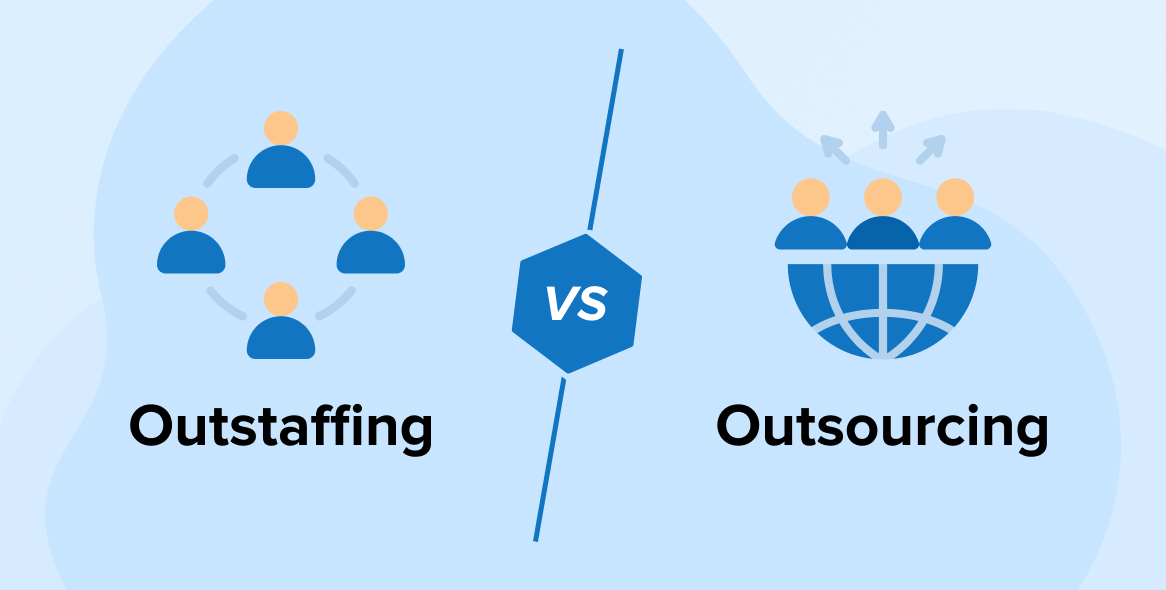
Businesses have reached a point where they are sure to develop a software development project but are not sure which way to pick. Not that there are many options available in the market, but there is still confusion when it comes to the popular two ways of software development. One’s dilemma always lies between choosing in-house software development or choosing a software outsourcing partner. However, just because the IT sourcing market is booming doesn’t imply it’s the best option for you. You must choose what best fits your development process and benefits your business in the long run. There are numerous aspects to consider before making a decision. Factors such as the scope of the project, technology proficiency, professionals required, budget, and several other similar factors will show them a headway to what to choose between the two.
In this blog, the sole intent behind this one is to give a clear picture of which one is better between the in-house development team and the software outsourcing team. It will also enlighten you to make a choice and how will it benefit your business in the long run, So brace yourself to get introduced to the new set of information on in-house app development vs outsourced development.
1. In-House Development
One of the most convenient ways of developing business software solutions is using In-house software development and taking advantage of software developers. The reason behind this is quite straightforward and simple. Everything goes as per your needs and convenience. Yes, you have your own set of resources, you can hire them as per your project plans, your timeline, and your own way of doing it. In-house development allows you to create your own development team from the ground up. You’ll be tasked with filling open roles depending on the skill sets and expertise required to complete the project. Like there are companies like Amazon and PayPal hiring their own developers, which gives them complete control over the project at a greater cost.
Now, if you are choosing in-house development, it is similar to hiring permanent employees for your company. An in-house development team means developing your own IT team, and taking each step for your business on your own like recruiting, interviewing, and onboarding process. It may be feasible to just go for in-house services if your business is only focused on an IT product.

1.1 Pros of In-House Development
In-house software development is all about your way of doing business and processing the methods accordingly. In your development, you are imbibing your company’s values in the developing project. There are many aspects that can favor your business when you develop in-house applications. It would be exciting to discuss the advantages of in-house software development.
1. Favorable Culture
A high-spirited staff that represents the company’s basic principles drives successful businesses. With in-house development, you may select team members who are compatible with the startup’s culture. When a team of in-house developers works together, you’ll get better outcomes, which is something you won’t get if you outsource your project development.
2. Clarity & Communication
The ability to communicate directly is a clear advantage of having an in-house team. An in-house team is dedicated solely to your firm, and its employees are generally housed at a physical location. You don’t have to send repetitive emails, again and again, to get your idea clear to the team. You’ll find that having face-to-face communications speeds up talks, especially while the project’s specifications are being finalized.
3. Immediate Help For Changes
One of the largest benefits of working with in-house projects is when you release a new product, problems are bound to appear. With an in-house team, can be completed quickly and remedies implemented quickly. If you’re working with an outsourced software product development team, the response time may be delayed because the team may be overworked right now.
1.2 Cons of In-House Development
Of course, nothing comes with just the aids, hence here are a few drawbacks as well:
1. Expensive for Some Projects
It necessitates businesses to make a considerable initial investment, particularly for small and large-scale enterprises. If your procedures are poorly organized, you’ll have to spend money even on inactivity. The approach, on the other hand, works effectively in mid-scaled projects and the result is also quite quick.
2. Inconsistent Employees
Professionals leaving the project or company is one of the most significant barriers in in-house software development. If there is a significant software developer involved in the process, and if she decides to leave, that’s the major after investing a significant amount in their adaptation, and then resources quit, so you’ll need to engage money again in new team members. That delays projects and also has to face losses in terms of time and money.
3. Communication Hurdles
Although offline communication is more convenient, it can hinder productivity. In the office, there’s always time for chit-chat around the coffee machine. Because coworkers are running around, there are more distractions in the office. Furthermore, the outcome is your responsibility, not the development outsourcing teams.
2. Software Outsourcing
Software Outsourcing is not a new term. Is it? You might have heard it or even read it in many places. So, in brief, if we were to define software outsourcing then we would say that it is a process of consigning software development tasks to experts of the industry. You can employ a team from another company to develop a complete project or assist you with certain tasks for your projects. If we outsource software development services, you can save on many aspects like time, money, efforts, resource hiring, and paying, infrastructure, and many minor aspects too.
Many outsourcing firms provide high-quality outsourced software development services because they provide technical specialists with exceptional technical backgrounds and knowledge. For obvious reasons, contracting a software development partner is a good choice and it comes to benefits, it offers lucrative benefits.

2.1 Pros of Outsourcing Software Development
Following are the advantages of outsourcing software development.
1. The Rate of Development
The speed of development of an in-house team is determined by the number of developers on staff. Integrating a complete team or temporarily supplementing your own is considerably easier and faster with outsourcing.
2. Expertise in Terms of Cost
Outsourced software development costs less than in-house software development because outsourcing development teams are more likely to have a higher development experience across a broad range of disciplines. There is no need to add fresh professionals to your in-house IT staff if an uncommon situation emerges. With good planning, you may achieve the same goal on a more cost-effective budget.
3. Scaling of Teams
Unlike in-house development, the scaling of a team is quite easy. You do not lose any money if you need to swiftly increase your development outsourcing team or if you need to reduce workers. Everyone is replaceable and it is easy to scale up and down resources.
2.2 Cons of Outsourcing Software Development
Following are the disadvantages of outsourcing software development.
1. Lack of Control
This is a myth actually which makes business owners believe that if you outsource you lose control. Well, that’s not true, in fact, you have more control like you can always order what you want. You can communicate your needs within a specific deadline and your partnered outsourcing company has to provide it anyhow.
It is true that an outsourced workforce does not work exclusively on your project for you. They have many projects but the assigned resources will work just for your project. There is no other play there. Just because the work is not done within your office premises makes business owners feel they have limited influence over the development of the project, cannot access progress or track it, or even troubleshoot the project. You may be unaware of what’s going on with your project if you don’t have direct access to the team. It may take a few hours or days for your communications to be responded to, and bug fixes are not always available.
2. Communication/ Cultural Barrier
Sometimes due to the time zone difference, it is daunting to schedule a meeting with a software development company that is located outside your location. If the outsourced team leader has trouble comprehending your concerns, it may not always be because of communication, it can also be due to a language barrier or the company’s cultural differences.
3. Concerns about Confidentiality
When you outsource, you’re giving confidential data to a third-party developer. You might be concerned about the agency’s privacy policies or if it would accept projects from competitors in the future. As a result, it’s critical to check out the agency’s track record and sign an NDA to legally safeguard your interests.
3. When To Use Outsource Development?
Most enterprises are in a dilemma when it comes to the process of selecting between two outsourcing and in-house application development. The dilemma is not about whom to outsource but to decide when to outsource. Also, despite the seemingly high expense, you have compelling reasons to decide when to outsource. In this process of outsourcing, majorly there are two factors that can influence your decision.
3.1 The First Factor is Budget Limitation
If you’re not a bootstrapped startup with a lot of cash on hand, hiring an in-house team will provide you with all of the benefits and none of the drawbacks.
3.2 When You Cannot Afford the Possibility of Problems Arising
Yes, this is one of the cases, when you should think of outsourcing when you have no control over things and don’t know how to mitigate them. Every choice affecting the product’s development is made by your own team. Any issues are dealt with as quickly as possible.
3.3 When Your Business Lacks Talented Resources
You must consider outsourcing your business when you do not have enough talent the business. You may have to spend your budget to hire, train, and finally pay them for all your dynamic changing needs. Here outsourcing development needs can be fruitful as it helps you utilize their best talents and also delivers expected results.
3.4 Lack of Infrastructural Constraints
Changing technology demands newer infrastructural needs. When your business has to spend again and again on technology needs, it is better to hire an outsourcing company to fulfill all your business needs in a cost-effective manner.
4. Which One is the Best Choice?
After all, there is no panacea to this prevailing question of who wins between In-house vs Software outsourcing. It completely depends on what works for one business may not work for another. In order to choose one, you’ll need to assess your needs and resources. In some circumstances, combining the two will yield the best results. You’ll need to identify the correct and ideal provider to deal with as it has been already advised previously.






Whenever companies decide to develop software applications they face problems in taking decisions whether they develop in-house or hire outsourcing partners. This article discusses all aspects which we need to consider while comparing in-house and outsourcing.
Article gives the complete difference between in-house development and software outsourcing. We can refer to this article to consider different factors while making selection between them. But I think Onshoring also can be included in this article.
When it comes to our business, we want to do everything in our leadership or infront of our eyes. For this we develop an in-house team to look after these tasks. But sometimes it is possible that your in-house team is not able to perform some task or they are not able to do it in an efficient or speedy manner. Hence we must consider outsourcing. This article is a perfect guide to help you to make a decision.
This article is able to clear my confusion whether I outsource my work or do it by ourselves. It discusses every detail of these two models.I am now able to decide which work needs to be outsourced and which should be done by in-house employees.
Choosing between in-house development and outsourcing can be a challenging decision for any organization. Both options have their own advantages and considerations that need to be weighed carefully. This article can help you to choose right available option.